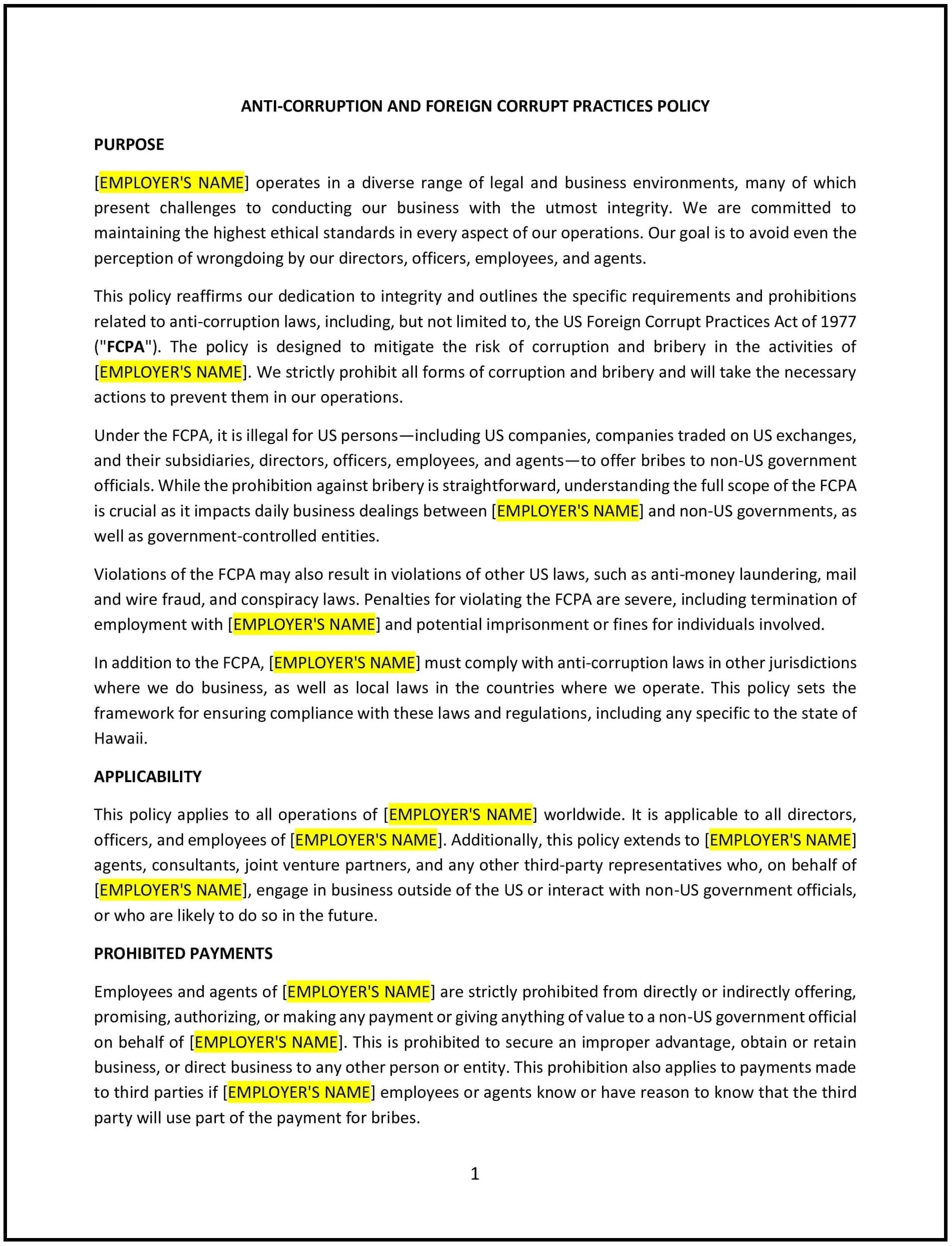Anti-corruption and foreign corrupt practices policy (Hawaiʻi): Free template
Got contracts to review? While you're here for policies, let Cobrief make contract review effortless—start your free review now.

Customize this template for free
Anti-corruption and foreign corrupt practices policy (Hawaiʻi)
An anti-corruption and foreign corrupt practices policy helps Hawaiʻi businesses establish clear guidelines to prevent unethical practices, such as bribery, fraud, or improper influence in business dealings. This policy is designed to promote transparency, integrity, and accountability in both domestic and international operations. It provides a framework for businesses to address risks related to corruption and align with global standards, such as the U.S. Foreign Corrupt Practices Act (FCPA), while considering Hawaiʻi-specific legal and cultural contexts.
By adopting this policy, businesses in Hawaiʻi can demonstrate their commitment to ethical practices, build trust with stakeholders, and reduce the risk of legal or reputational harm.
How to use this anti-corruption and foreign corrupt practices policy (Hawaiʻi)
- Define the scope of the policy: Clearly outline the types of activities and transactions covered, including interactions with government officials, third-party vendors, and international partners. The policy should apply to all employees, contractors, and business partners.
- Establish clear guidelines: Provide specific examples of prohibited behaviors, such as offering or accepting bribes, facilitating payments, or engaging in fraudulent activities. Include Hawaiʻi-specific considerations, such as local laws and cultural norms.
- Implement training programs: Businesses should educate employees and stakeholders on the policy’s requirements, the risks of corruption, and how to report potential violations. Training should be tailored to the unique needs of Hawaiʻi-based businesses.
- Create reporting mechanisms: Develop a confidential and accessible system for employees and partners to report suspected violations of the policy. Ensure protections for whistleblowers to encourage transparency.
- Conduct regular audits: Businesses should periodically review their operations, financial records, and third-party relationships to identify and address potential risks of corruption.
- Align with global standards: Incorporate principles from international frameworks, such as the FCPA, to ensure the policy meets global expectations for ethical business practices.
- Monitor and update the policy: Regularly assess the effectiveness of the policy and make adjustments as needed to reflect changes in Hawaiʻi laws, industry standards, or business operations.
Benefits of using this anti-corruption and foreign corrupt practices policy (Hawaiʻi)
This policy offers several advantages for Hawaiʻi businesses:
- Promotes ethical business practices: By establishing clear guidelines, businesses can foster a culture of integrity and accountability, reducing the risk of unethical behavior.
- Builds stakeholder trust: Demonstrating a commitment to anti-corruption practices can enhance relationships with customers, investors, and partners, both locally and internationally.
- Reduces legal and financial risks: Adopting this policy helps businesses avoid penalties, fines, or reputational damage associated with corruption-related violations.
- Supports global operations: For businesses with international ties, this policy ensures alignment with global anti-corruption standards, such as the FCPA, facilitating smoother cross-border transactions.
- Enhances corporate reputation: A strong anti-corruption stance can differentiate businesses in Hawaiʻi as ethical leaders, attracting like-minded partners and customers.
- Encourages employee confidence: Clear guidelines and protections for whistleblowers empower employees to act ethically and report concerns without fear of retaliation.
Tips for using this anti-corruption and foreign corrupt practices policy (Hawaiʻi)
- Communicate the policy effectively: Share the policy with all employees, contractors, and partners through onboarding materials, training sessions, and internal communications.
- Lead by example: Ensure leadership demonstrates a commitment to the policy by adhering to its principles and encouraging ethical behavior at all levels of the organization.
- Provide ongoing training: Regularly update employees on anti-corruption best practices, changes in Hawaiʻi laws, and global standards to maintain awareness and compliance.
- Monitor third-party relationships: Businesses should vet vendors, suppliers, and partners to ensure they align with the policy’s ethical standards.
- Review and update the policy: Periodically assess the policy’s effectiveness and make adjustments to reflect evolving risks, regulations, or business needs.